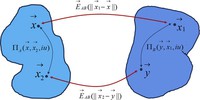

| Funding period: | Nov. 1, 2020 to Dec. 31, 2021 |
| Agency: | transCampus |
| Further details: | https://transcampus.eu/projects/ |
| https://transcampus.eu/ | |
| Part of the following collaborative project: | transCampus partnership, King's College London and Technische Universität Dresden |
We acknowledge funding by the transCampus project "Disentangling the Design Principles of Chiral-Induced Spin Selectivity (CISS) at the Molecule/Electrode Interface for Practical Spintronic Applications" (Transcampus-CISS, grant agreement ID: tC RA 2020-01)
The Chirality-Induced Spin Selectivity (CISS) has recently emerged as a powerful alternative to ease the design of nanoscale spintronic devices. The intrinsic room-temperature spin-polarization power of a chiral molecular structure allows one to manipulate and control spintronic interfaces without the need for a permanent magnet, which significantly simplifies the device design. Beyond applications, the fundamental understanding of CISS extends all the way to biology, bringing explanations to outstandingly efficient biological processes such as biorecognition or long-range charge diffusion.
The present King’s College-TUD consortium aims for a comprehensive study of the spintronic details of a chiral molecule/electrode interface as function of key experimental parameters determining its spin-polarization performance, namely, intrinsic molecular dipole, molecular length, electrode/molecule coupling strength and electrode material. Comprehensively measuring all these variables in the exact same system will directly place us in position to, first, fully understand the physical basis of a CISS-based molecule/electrode interface, and second, configure a much desired list of design principles for future CISS-based spintronic devices.
The above study requires a unique team of researchers blending experimental tools to accurately measure nanoscale spin-dependent charge transport (KCL) and a theoretical group with experience in atomistic modelling (TUD). This is naturally fulfilled in this application.









| Funding period: | Nov. 1, 2020 to Dec. 31, 2021 |
| Agency: | transCampus |
| Further details: | https://transcampus.eu/projects/ |
| https://transcampus.eu/ | |
| Part of the following collaborative project: | transCampus partnership, King's College London and Technische Universität Dresden |
We acknowledge funding by the transCampus project "Disentangling the Design Principles of Chiral-Induced Spin Selectivity (CISS) at the Molecule/Electrode Interface for Practical Spintronic Applications" (Transcampus-CISS, grant agreement ID: tC RA 2020-01)
The Chirality-Induced Spin Selectivity (CISS) has recently emerged as a powerful alternative to ease the design of nanoscale spintronic devices. The intrinsic room-temperature spin-polarization power of a chiral molecular structure allows one to manipulate and control spintronic interfaces without the need for a permanent magnet, which significantly simplifies the device design. Beyond applications, the fundamental understanding of CISS extends all the way to biology, bringing explanations to outstandingly efficient biological processes such as biorecognition or long-range charge diffusion.
The present King’s College-TUD consortium aims for a comprehensive study of the spintronic details of a chiral molecule/electrode interface as function of key experimental parameters determining its spin-polarization performance, namely, intrinsic molecular dipole, molecular length, electrode/molecule coupling strength and electrode material. Comprehensively measuring all these variables in the exact same system will directly place us in position to, first, fully understand the physical basis of a CISS-based molecule/electrode interface, and second, configure a much desired list of design principles for future CISS-based spintronic devices.
The above study requires a unique team of researchers blending experimental tools to accurately measure nanoscale spin-dependent charge transport (KCL) and a theoretical group with experience in atomistic modelling (TUD). This is naturally fulfilled in this application.






